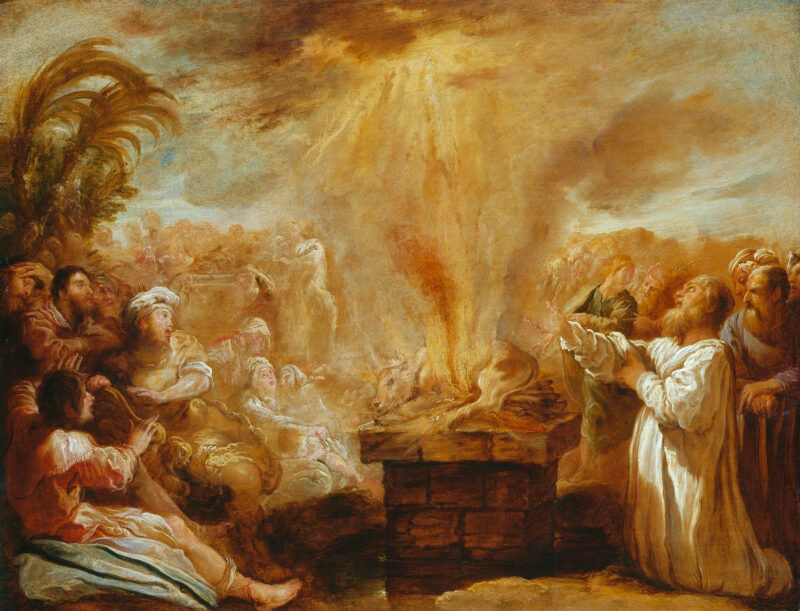When they reached the crowd, a man approached and knelt down before him. “Lord,” he said, “have mercy on my son, because he has seizures and suffers terribly. He often falls into the fire and often into the water. I brought him to your disciples, but they couldn’t heal him.”
Jesus replied, “You unbelieving and perverse generation, how long will I be with you? How long must I put up with you? Bring him here to me.” Then Jesus rebuked the demon, and it came out of him, and from that moment the boy was healed.
Then the disciples approached Jesus privately and said, “Why couldn’t we drive it out??”
“Because of your little faith,” he told them. “For truly I tell you, if you have faith the size of a mustard seed, you will tell this mountain, ‘Move from here to there,’ and it will move. Nothing will be impossible for you.”
—Matthew 17:14-20
I like horror films. One reason is they remain one of the few contemporary media where good and evil retain their clear delineations. What is more satisfying than good triumphing over evil?
I watched the horror-thriller Heretic over the weekend. Hugh Grant plays an older man who invites two female Mormon missionaries into his home, whereupon he plays a cat and mouse game with them regarding issues of faith, belief, and the source of all human religion.
At one point in the film, one of the missionaries gives a speech detailing science’s dismantling of the efficacy of prayer, equating prayer to nothing more than well-wishing and a harmless activity to bond people together in some common concern. She thinks it has value socially—even if it’s all supernatural hooey in the end.
In the days following the film, which I thought merely OK, I’ve pondered a disturbing trend I see among fairly orthodox Christian believers regarding prayer: Prayer merely as psychological comfort.
Nothing I read in the Scriptures reduces prayer to being little more than a balm for the soul. To me, diminishing prayer in that way warps it into an unnatural and impotent function that verges on self-talk.
And yet I see that mentality everywhere in the contemporary Western Church. I read material that reinforces the idea that prayer’s main function is to change our minds about the thing we prayed for, so we can come to grips with our prayer failing to do anything.
“Don’t expect any miraculous answers to prayer, because prayer is about changing you to be OK with trusting God anyway when that ephemeral bubble of praying for a need ultimately pops.” That seems to be where we are.
As if Jesus didn’t make his point clear enough in that Matthew passage above, here He restates His position a little later:
Early in the morning, as he was returning to the city, [Jesus] was hungry. Seeing a lone fig tree by the road, he went up to it and found nothing on it except leaves. And he said to it, “May no fruit ever come from you again!?” At once the fig tree withered.
When the disciples saw it, they were amazed and said, “How did the fig tree wither so quickly??”
Jesus answered them, “Truly I tell you, if you have faith and do not doubt, you will not only do what was done to the fig tree, but even if you tell this mountain, ‘Be lifted up and thrown into the sea,’ it will be done. And if you believe, you will receive whatever you ask for in prayer.”
—Matthew 21:18-22
Where is Jesus conceding any point on the efficacy of prayer? When does He say prayer is REALLY just about God wanting to spend time with us, even if nothing we pray for ever comes to pass?
Frankly, I despise that mentality, and yet it is everywhere among people who call themselves Christians. It’s such a distorted, nihilistic perspective to think that God values spending time with us even if He really has no intention to do anything about our prayer concerns. It’s crazy that prayer becomes solely a means to cope rather than how we go forward in power in Jesus’s name. It’s ludicrous that prayer’s main goal in the minds of many is to convince ourselves to be OK with God failing to do what we ask in His name.
James never understood prayer to function in that deprecated way. He saw it like this:
The prayer of a righteous person is very powerful in its effect. Elijah was a human being as we are, and he prayed earnestly that it would not rain, and for three years and six months it did not rain on the land. Then he prayed again, and the sky gave rain and the land produced its fruit.
—James 5:16-18
If prayer ever becomes a way for us to convince ourselves that our earnest beseeching of God was accomplishing nothing more than hanging out with Him and enjoying Him regardless, then we have lost our faith. People who preach and teach such a thing have lost their faith. Stop listening to them.
Image: “The Sacrifice of Elijah Before the Priests of Baal” (1622) by Domenico Fetti


